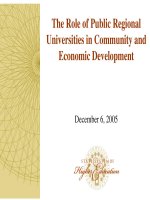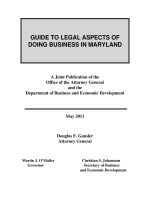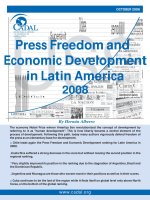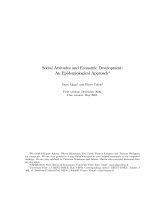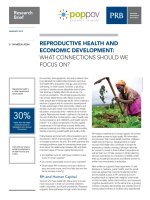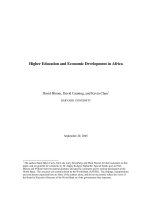chang (ed.) - institutional change and economic development (2007)
Bạn đang xem bản rút gọn của tài liệu. Xem và tải ngay bản đầy đủ của tài liệu tại đây (3.41 MB, 329 trang )
Institutional Change and
Economic Development
The UNU World Institute for Development Economics Research (UNU-
WIDER) was established by the United Nations University as its first
research and training centre and started work in Helsinki, Finland, in 1985.
The purpose of the institute is to undertake applied research and policy
analysis on structural changes affecting developing and transitional
economies, to provide a forum for the advocacy of policies leading to robust,
equitable and environmentally sustainable growth and to promote capacity-
strengthening and training in the field of economic and social policy-
making. Its work is carried out by staff researchers and visiting scholars in
Helsinki and via networks of collaborating scholars and institutions around
the world.
World Institute for Development Economics Research (UNU-WIDER)
Katajanokanlaituri 6 B, FIN-00160 Helsinki, Finland
www.wider.unu.edu
Institutional Change and
Economic Development
Edited by
HA-JOON CHANG
Faculty of Economics, University of Cambridge
NORTH AMERICA AND GENEVA EDITION
This edition first published in the USA by
UNITED NATIONS UNIVERSITY PRESS, 2007
United Nations University Office at the United Nations, New York
2 United Nations Plaza, Room DC2-2062, New York, NY 10017, USA
Tel: +1-212-963-6387 Fax: +1-212-371-9454 E-mail:
United Nations University Press is the publishing division of the United Nations University.
United Nations University Press
United Nations University, 53-70, Jingumae 5-chome,
Shibuya-ku, Tokyo 150-8925, Japan
Tel: +81-3-3499-2811 Fax: +81-3-3406-7345 E-mail:
General enquiries: • Web:
Copyright © United Nations University, 2007
The views expressed in this publication are those of the authors and do not necessarily
reflect the views of the United Nations University. All rights reserved.
Library of Congress Cataloging-in-Publication Data
Institutional change and economic development / edited by Ha-Joon Chang.
p. cm. “The chapters in the volume were all prepared for the UNU-WIDER project on
'Institutions and Economic Development:
Theory, History, and Contemporary Experiences.' An initial project planning meeting was
held in Oxford in March 2004.
The project meeting was held in April 2005 at WIDER in Helsinki” P.
Includes bibliographical references and index.
ISBN-13: 978-9280811438 (pbk.)
1. Economic development Congresses. 2. Institutional economics Congresses. 3.
Economic policy Congresses. I. Chang, Ha-Joon.
HD73.I568 2007
338.9 dc22
2007020214
ISBN: 978-92-808-1143-8 (North America and Geneva edition - Pbk)
UK
/ EUROPE / SOUTH ASIAN EDITION
Anthem Press
An imprint of Wimbledon Publishing Company
www.anthempress.com
This edition first published in UK, 2007
by ANTHEM PRESS
All rights reserved.
75–76 Blackfriars Road, London SE1 8HA, UK
or PO Box 9779, London SW19 7ZG, UK
A catalogue record for this book is available from the British Library.
ISBN: 978-1-84331-281-9 (UK edition – Pbk)
Cover illustration: Detail from ‘Preparation of War to Defend Commerce’
by William Russell Birch, 1799. Courtesy of the Naval Historical Foundation.
1 3 5 7 9 10 8 6 4 2
Printed in India
Advance Reviews
“Just when the institutionalist approach to economic development is at risk
of seeming like a ‘black box’ for tautological non-explanations, this volume
of richly historically informed and nuanced studies will restore confidence in
the value, if not superiority of this approach to the political economy of
development.”
Jomo K.S.,
Assistant Secretary-General for Economic Development, United Nations
“Much has been said about institutions in development, but this book takes
us to a new level of analysis, with a very thorough understanding of the
history and political economy of institution-building. Along the way it
demolishes much of the conventional wisdom, and sets a new standard that
all future research on institutions must match.”
Tony Addison,
Executive Director of the Brooks World Poverty Institute, University of Manchester
“A thought-provoking and challenging analysis of the role of institutions in
economic development. It is a necessary antidote to the orthodox writings
on this subject. A must read.”
Ajit Singh,
Professor of Economics, University of Cambridge
“There is a growing confluence of economic opinion on the centrality of
institutions in the development process but few detailed comparative
historical studies of the interface between their form, function and context.
Ha-Joon Chang, under the sponsorship of WIDER, has assembled a cogent
set of essays richly presenting a tapestry of institutional experiences from
virtually every region of the world. The volume will prove to be an
important resource to counter the latest institutional orthodoxies on
governance and property rights coming from the World Bank and IMF as
countries look beyond the latest fashions from the Bretton Woods
organizations.”
Howard Stein,
University of Michigan
CONTENTS
List of Figures ix
List of Tables xi
List of Contributors xiii
Foreword by Deepak Nayyar xvii
Acknowledgements xxi
1. Institutional change and economic development:
An introduction 1
Ha-Joon Chang
Part I: Theoretical Overview
2. Understanding the relationship between institutions and
economic development – some key theoretical issues 17
Ha-Joon Chang
3. Extending the ‘institutional’ turn: Property, politics, and
development trajectories 35
Peter B. Evans
4. Institutionalism ancient, old, and new: A historical perspective
on institutions and uneven development 53
Erik S. Reinert
Part II: Evolution of Particular Institutions
5. Modern bureaucracy 75
John Toye
6. Central banks as agents of economic development 95
Gerald Epstein
7. Corporate governance, innovative enterprise, and
economic development 115
William Lazonick
8. The political economy of taxation and tax reform in
developing countries 135
Jonathan di John
viii
CONTENTS
9. The rule of law, legal traditions, and economic growth:
The East Asian example 157
Meredith Jung-En Woo
Part III: Country Experiences
10. State formation and the construction of institutions for the first
industrial nation 177
Patrick Karl O’Brien
11. The role of federalism in developing the US during
nineteenth-century globalization 199
Eric Rauchway
12. Institutions and economic growth: The successful experience of
Switzerland, 1870–1950 219
Thomas David and André Mach
13. The rise and halt of economic development in Brazil,
1945–2004: Industrial catching-up, institutional innovation, and
financial fragility 239
Leonardo Burlamaqui, José A. P. de Souza, and Nelson H. Barbosa-Filho
14. Rethinking import-substituting industrialization: Development
strategies and institutions in Taiwan and China 261
Tianbiao Zhu
15. Developmental nationalism and economic performance in
Africa: The case of three ‘successful’ African economies 281
Julius Kiiza
Index 301
The use of particular designations of countries or territories does not imply
any judgement by United Nations University as to the legal status of such
countries or territories, of their authorities and institutions or of the
delimitation of their boundaries. The designations ‘developed’ and
‘developing’ regions are intended for statistical and analytical convenience
and do not necessarily express a judgement about the stage reached by a
particular country or area in the development process.
FIGURES
5.1 The tripod model of state control 90
10.1 Total taxes collected for the state, 1490–1820 184
10.2 Debt servicing ratios as a percentage of total taxes,
1688–1814 186
10.3 Total tax revenues expressed as shares of conjectures for
national income, 1490s to 1810s 187
10.4 Numbers of warships in the service of the Royal and rival
navies, 1650–1810 189
11.1 The path of the Union Pacific railway, one of the great
successes and scandals of post-Civil War railway
construction, showing the railroad passing through seven of
the twelve post-Civil War states 210
12.1 Institutions and economic growth in small European
countries: A simple model 223
14.1 Relative weight of heavy industry and light industry in
manufacturing production in Taiwan, 1961–91 264
14.2 Growth of heavy and light industries in China, 1990–2004 273
TABLES
7.1 US corporate stock and bond yields, 1960–2005 119
8.1 Resource mobilization and poverty in developing countries:
Regional comparisons 139
8.2 Personal income and property tax burden: Latin America,
East Asia, South Africa, and Eastern Europe compared 148
8.3 Income, profits, and capital gains burden: East Asia, Latin
America, South Africa, and Eastern Europe compared 149
8.4 Value-added taxes in Latin America, East Asia, South
Africa, and Eastern Europe compared 151
11.1 Lindert’s model showing how regional autonomy
encourages the establishment of schools 202
11.2 Capital called on British market by economic sector,
1865–1914 206
12.1 Rates of growth and levels of real GDP per capita,
1870–1950 224
13.1 Basic macroeconomic indicators of Brazil 242
CONTRIBUTORS
Nelson Henrique Barbosa-Filho, PhD, economist, is currently Deputy
Secretary for Macroeconomic Policy at the Finance Ministry, Brazil, on
leave from the Institute of Economics, UFRJ Federal University, Rio de
Janeiro. His main research interests are macroeconomic policy, econometric
modelling, and financial development.
Leonardo Burlamaqui, PhD, economist, is currently working with the
Ford Foundation, New York, as Programme Officer (Governance and Civil
Society; Global Economic Governance) on leave from UERJ State
University, Rio de Janeiro. His main research interests are evolutionary
economics, global economic governance, patterns of economic
development, competition, innovation, and economic regulation.
Ha-Joon Chang is the Reader in the Political Economy of Development at
the Faculty of Economics, University of Cambridge, UK.
Thomas David is Assistant Professor at the Institute of Economic and Social
History, University of Lausanne, Switzerland, and previously a visiting scholar
at the Center for European and Russian Studies, University of California
(UCLA). With André Mach, and financed by the Swiss National Science
Foundation, he co-directs a project on the Swiss elites during the twentieth
century. His publications include a volume about the participation of
Switzerland in the Atlantic Slave trade (La Suisse et l'esclavage des Noirs,
Lausanne, 2005, with Bouda Etemad and Janick Marina Schaufelbuehl), and
forthcoming, a book on the history of corporate governance in Switzerland
(with Martin Lüpold, André Mach, and Gerhard Schnyder).
José Antonio Pereira de Souza, PhD, economist, is currently working as
Economic Advisor to the Board of Directors at BNDES (National Bank for
Economic and Social Development), and is Assistant Professor at Candido
Mendes University, Rio de Janeiro. His research interests include financial
development, technology, and the economic regulation of business.
Jonathan di John is a lecturer of Political Economy of Development in the
Department of Development Studies at the School of Oriental and African
Studies (SOAS), University of London. He is also a research fellow on the
xiv
CONTRIBUTORS
Crisis States Research Programme at the London School of Economics. Dr
di John’s research focuses on the political economy of industrial policy and
economic growth in Latin America, and the political economy of taxation
and tax reform in less developed countries.
Gerald Epstein is Professor of Economics and founding Co-Director of
the Political Economy Research Institute (PERI) at the University of
Massachusetts, Amherst. His major areas of research are Macroeconomics
and International Economics and his recent publications include two edited
volumes (both Edward Elgar, 2005), Financialization and the World Economy and
Capital Flight and Capital Controls in Developing Countries.
Peter B. Evans holds the Eliaser Chair of International Studies and is
Professor of Sociology in at the University of California, Berkeley. He has
worked for many years on the role of the state in promoting development,
an interest reflected in his 1995 book Embedded Autonomy: States and Industrial
Transformation. His current projects include a manuscript in progress on
‘counter-hegemonic globalization’ that focuses on the role of transnational
social movements.
Julius Kiiza teaches the Political Economy of Development in the
Department of Political Science and Public Administration at Makerere
University. After his doctoral studies at the University of Sydney, Dr Kiiza
won a prestigious fellowship to pursue postdoctoral studies at the University
of Cambridge. He was recently a Visiting Professor (Dickinson College,
USA) of the US Summer Institute working on the ‘US Political Economy
and the Global Economic System’. He has implemented several research
projects financed by UNU-WIDER, DFID, the Global Development
Network, and other agencies, and publishes in the areas of economic
governance, institutional reform, and the political economy of development.
William Lazonick is Professor at the University of Massachusetts Lowell
and Distinguished Research Professor at INSEAD (European Institute of
Business Administration). He specializes in the study of industrial development
and international competition. Currently he is writing a book on the
implications of the ‘new economy business model’ for the evolution of high-
tech employment opportunities in the United States. Many of his papers are
available electronically at
André Mach is Senior Lecturer in Comparative Political Economy at the
Institute of Political and International Studies, University of Lausanne,
Switzerland. His research areas include organized interests and business
elites, Swiss corporate governance, industrial relations, competition policy,
and more generally the impact of globalization on national policies.
CONTRIBUTORS
xv
Patrick Karl O’Brien, former Director of the Institute of Historical
Research at the University of London and past president of the British
Economic History Society, is now a Centennial Professor of Economic
History at the London School of Economics where he acts as Convenor of
GEHN (global economic history network) and teaches on the masters
programme in global economic history. His publications in European,
Egyptian, and global economic history are on his website. His current book
is about regimes for the production of useful and reliable knowledge in
Europe and China, l368–1842.
Eric Rauchway is Professor of History at the University of California, Davis,
and the author most recently of Blessed Among Nations: How the World Made
America (Hill and Wang, 2006), and Murdering McKinley: The Making of Theodore
Roosevelt’s America (Hill and Wang, 2003).
Erik S. Reinert is Professor of Technology Governance and Development
Strategies at Tallinn University of Technology, Estonia, and heads The
Other Canon Foundation, Norway (www.othercanon.org). His main
research area is the theory of uneven development. His books include How
Rich Countries Got Rich and Why Poor Countries Stay Poor (Constable, 2007) and
The Origins of Development Economics: How Schools of Economic Thought Have
Addressed Development (Zed, 2005, edited with Jomo K.S.).
John Toye has been successively a Professor of Development Economics at
the universities of Wales, Sussex, and Oxford. He has also worked for the
United Nations, as Director of the Globalization Division of UNCTAD
Secretariat 1998–2000. He has written seven books, his first being Public
Expenditure and Development Policy in India (Cambridge University Press, 1981)
and his most recent being The UN and Global Political Economy (Indiana
University Press, 2004, with Richard Toye).
Meredith Jung-En Woo is Professor of Political Science at the University
of Michigan, USA. Her publications include Race to the Swift (Colombia
University Press) and The Developmental State (Cornell University Press 1999).
Tianbiao Zhu is Associate Professor, Chair of the Department of Political
Economy and Associate Dean of the School of Government, Peking
University. He received his degrees from University of Sydney, Cambridge
University, and Cornell University. His research focuses on political
economy of development.
FOREWORD
Until not so long ago, the understanding of institutions in the profession of
economics was, to say the least, limited. Economists treated institutions as a
black box, in much the same way that they treated technology for some
time. Yet orthodox prescriptions, advocated by multilateral institutions and
bilateral donors, sought to harmonize the role and also the form of
institutions across developing countries irrespective of space or time. The
underlying presumption that one-size-fits-all was wrong. There are
specificities in space: institutions are local and cannot be transplanted out of
context. There are specificities in time: institutions need time to evolve and
cannot be created by a magic wand. But this was not quite recognized.
There has been a discernible change in the situation since the 1990s as
the role of institutions in economic development received increasing
attention in the literature. This emerging interest is perhaps attributable to
experience. Economic reforms that sought to focus on policies but neglected
institutions met with failure. Economic liberalization that moved from over-
regulated to under-governed systems led to financial crises. Economic
conditionalities of lenders or donors who attempted to harmonize
institutions across countries ran into difficulties. This experience coincided
with developments in institutional economics, both orthodox and heterodox,
which contributed to an understanding of institutions.
The recent recognition of the significance of institutions, even if late, is
welcome. But there are unanswered questions. First, we do not know exactly
what institutions in exactly what forms are necessary, or at least useful, for
economic development in what contexts. Second, even where we
understand what role particular institutions can play in economic
development, we often do not know how to build such institutions. Indeed,
much remains to be done, in theory and policy, to improve our
understanding of the creation and evolution of institutions. This book
endeavours to fill these intellectual gaps. In doing so, it makes a valuable
contribution to our knowledge and understanding of the subject.
xviii
FOREWORD
The structure of the volume is unusual. Its contents are new. The
approach is different. The first part, which provides a theoretical overview,
translates the abstract theoretical notions that underlie the present
discussions on the role of institutions in economic development into more
concrete terms that are relevant for policymakers. The second part, which
considers the evolution of particular institutions, such as the bureaucracy,
central banks, corporate governance, taxation systems, and legal traditions,
with reference to a large number of countries over time and across space,
enriches theoretical understanding by revealing aspects of real-life
institutions that are unrecognized or neglected. The third part, which
examines experiences that range from Britain, Switzerland and the United
States in the industrialized world to Botswana, Mauritius, Uganda, Brazil,
China, and Taiwan in the developing world, studies institutions in their
national historical context to extract stylized facts and draw lessons from
experience. Some other country experiences are also discussed in the
theoretical and the thematic chapters, although not in as much depth as in
the case-study chapters. These include Colombia, Costa Rica, El Salvador,
Guatemala, Japan, Korea, Malaysia, and South Africa. Given the diversity
and complexity of the subject, the study of institutions requires a multi-
disciplinary if not inter-disciplinary approach. Thus, the contributors to the
volume are drawn from a wide range of disciplines: economics, political
science, history, sociology, public administration, and business management.
The findings that emerge from the study are valuable. Some deserve
mention. Institutions can, and do, serve multiple functions, so that there is
no simple relationship between a desired function and an institutional form.
Appearances are deceptive, so that informal institutions based on local
values and norms may be far more important than formal institutions.
Institution building is not a technocratic exercise but an integral part of
political processes. The human factor, actors and ideas, is critical in
institutional change, so much so that institutions are often shaped by
someone somewhere who made choices that were not obvious or expected.
Institutional change is characterized by unintended consequences, positive
or negative, and by intended perversions, for better or for worse. In spite of
the differences, there are similarities between countries, so that there are
lessons for building institutions: for instance, it may be more effective to start
with desirable activities rather than with desirable institutions, the utility of
institutions may change over time as catalysts may turn into road-blocks,
and there are dangers implicit in an institutional over-dose as too much
could be counter-productive.
FOREWORD
xix
The essential conclusion to emerge is that there is no simple formula for
institutional development that countries can import or replicate. Different
countries find different solutions at different times for similar problems. In
fact, the study shows that real-life experiences of institutional development
have been achieved through a mixture of deliberate imitation, or
adaptation, of foreign institutions and local institutional innovations,
sometimes deliberate and sometimes accidental. Even so, there is much that
developing countries can learn, as latecomers, from what went wrong and
what turned out right elsewhere in the past. It is also important to recognize
that, in many ways, institutional development is a consequence rather than a
cause of economic development. Yet, there is some interdependence
between institutions and development that could, if concurrently pursued,
make for a virtuous circle of cumulative causation.
This volume provides a sensible blend of high-brow theoretical constructs
and down-to-earth empirical work to coax stylized facts and draw robust
conclusions. It shows that, even in this inherently complex area, it is possible
to extract some general principles that enrich our understanding, especially
if we are willing to beyond the rather narrow theoretical and empirical
confines of the orthodox discourse on institutions. By doing so, it injects
some new ideas and fresh thinking into the study of institutional change and
economic development.
Deepak Nayyar
Chair of the Board, UNU-WIDER, Helsinki
and
Professor of Economics, Jawaharlal Nehru University, New Delhi
ACKNOWLEDGEMENTS
The chapters in this volume were all prepared for the UNU-WIDER project
on ‘Institutions and Economic Development – Theory, History, and
Contemporary Experiences’. An initial project planning meeting was held in
Oxford in March 2004, between myself as the project director, and the
three most senior authors, Peter Evans, Patrick O’Brien, and John Toye.
Deepak Nayyar, the Chair of the WIDER Board (then the Vice-Chancellor
of Delhi University, currently back to his old job as a professor of economics
in Jawaharlal Nehru University) also took part in the meeting and provided
very helpful inputs. The project meeting was held in April 2005 at WIDER
in Helsinki. In addition to the authors of the chapters, Deepak Nayyar,
Jomo K.S. (Assistant Secretary-General, Department of Economic and
Social Affairs, United Nations), Thandika Mkandawire (Director, United
Nations Research Institute for Social Development), Ajit Singh (University
of Cambridge), and Howard Stein (University of Michigan) participated as
discussants and provided very helpful comments.
The subsequent process of revision and editing benefited greatly from the
support of WIDER staff. Tony Shorrocks, the director of WIDER, and the
members of the Board of WIDER, to whom I reported the progress of the
project in their June 2005 meeting, provided encouragement and extremely
useful critical reflections on the project. Tony Addison, the Deputy Director
of WIDER (and now Professor of Development Studies at the Institute for
Development Policy and Management, University of Manchester), not only
provided the administrative oversight but also critical intellectual inputs to
the project. Adam Swallow, the Publications Assistant, gave the project team
very helpful advice on the organization of the volume and oversaw the
editing process. The project staff, Barbara Fagerman, Tuuli Levit, and Janis
Vehmaan-Kreula provided efficient and kind support.
Ha-Joon Chang
Faculty of Economics, University of Cambridge
xxii
ACKNOWLEDGEMENTS
UNU-WIDER gratefully acknowledges the financial contributions to the
research programme by the governments of Denmark (Royal Ministry of
Foreign Affairs), Finland (Ministry for Foreign Affairs), Norway (Royal
Ministry of Foreign Affairs), Sweden (Swedish International Development
Cooperation Agency – SIDA), and the United Kingdom (Department for
International Development).
CHAPTER 1
INSTITUTIONAL CHANGE AND
ECONOMIC DEVELOPMENT:
AN INTRODUCTION
HA-JOON CHANG
1
1. The rising interest in the role of institutions in
economic development
The issue of institutional development, or ‘governance reform’, has come to
prominence during the last decade or so. During this period, even the IMF
and the World Bank, which used to treat institutions as mere ‘details’, have
come around to emphasizing the role of institutions in economic
development and tried to improve the institutions of developing countries as
a way of promoting their economic development. For example, the IMF put
great emphasis on reforming corporate governance institutions and
bankruptcy laws during the 1997 Asian crisis, while the World Bank’s 2002
annual report (Building Institutions for Markets) focused on institutional
development, although from a rather narrow point of view, as indicated by
its title. There are a few reasons behind this rather dramatic change in the
intellectual atmosphere.
First, the institution-free technocratic reform programmes promoted by
the IMF and the World Bank and by many donor governments since the
1980s have almost universally failed. Many of these reform programmes
blatantly ignored institutional differences across countries, thereby
recommending identikit policies, in what has come to be known as the ‘one-
size-fits-all’ approach to economic policy. Today, it is widely accepted even
by many orthodox economists that policies directly derived from the
experiences of the developed countries – or, even worse, from economic


